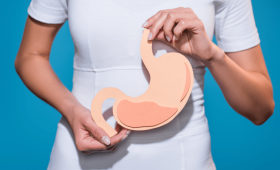What Is Gastric Bypass Surgery And How Does It Work?
Gastric Bypass surgery is one of the most effective and common bariatric surgical methods used in the treatment of obesity. In this procedure, the stomach is reduced to create a small stomach pouch (approximately 30-50 ml), and a portion of the small intestine is connected to this new pouch. Thanks to this dual-action mechanism, patients can physically eat less, and there is less calorie absorption because food bypasses a segment of the small intestine.
The surgery is performed using the laparoscopic method (keyhole surgery), leaving only small incisions on the body. This significantly accelerates the recovery process and shortens the length of hospital stay required. The procedure fundamentally alters the body’s digestive and hormonal systems to support significant and lasting weight loss.
Why Are Gastric Bypass Costs More Affordable In Istanbul?
Istanbul offers highly competitive prices for Gastric Bypass surgeries compared to Europe and other Western countries. The main reasons for this price advantage stem from the lower general cost of living, hospital operating expenses, and labour costs.
However, this does not mean that the quality of service is compromised. Many hospitals in Istanbul hold international accreditations such as JCI and use modern medical technology and state-of-the-art equipment. The high patient volume and government support for health tourism allow international patients to receive the highest standard of surgical care at the most favourable cost, maximizing value for money.
Who Is The Most Suitable Candidate For Gastric Bypass?
Ideal candidates for Gastric Bypass are generally individuals with a Body Mass Index (BMI) of 40 or higher, or those with a BMI between 35-40 who have severe health conditions related to obesity, such as type 2 diabetes, hypertension, or sleep apnea. Candidates must also have been unsuccessful in achieving permanent weight loss through previously implemented diet and exercise programs. Before the decision for surgery is made, the patient’s psychological readiness and their ability to adhere to post-operative lifestyle changes are among the most critical factors evaluated by the surgical team to ensure long-term success.
What Medical Tests Are Done Before The Surgery?
Prior to Gastric Bypass surgery, a comprehensive series of medical tests and consultations are performed to assess the patient’s suitability for surgery and the risk associated with anesthesia. These tests include a complete blood count, liver and kidney function tests, measurement of blood sugar and cholesterol levels, infectious disease screenings, and clotting tests. Furthermore, consultations with cardiology, chest diseases, and anesthesia specialists, as well as an endoscopy, are performed. All these preparations are meticulously completed in the hospital environment, usually one or two days after your arrival in Istanbul, ensuring optimal health and safety before the procedure begins.
How Are Accommodation And Transfers Organized In Istanbul?
Most obesity surgery packages in Istanbul cover accommodation and transfer services for the convenience of international patients. This service includes airport pick-up and drop-off transfers, as well as all transportation between the hospital and contracted hotels (typically 4 or 5-star). Seamless transportation is provided for patients’ pre-operative examinations and post-operative check-ups at the hospital. An intermediary company like Cure Holiday manages these logistical arrangements with the highest quality on your behalf, eliminating the stress of coordinating treatment in a foreign city and allowing you to focus entirely on your recovery journey.
How Long Does The Gastric Bypass Surgery Last?
Gastric Bypass surgery is a complex and sensitive procedure, typically lasting between 2 to 4 hours. The duration of the surgery can vary depending on the surgeon’s experience, the patient’s anatomical structure, any previous abdominal surgeries they have undergone, and the specific surgical technique used. Since this surgery is performed using the laparoscopic (keyhole) method, even if the patient’s time on the operating table is slightly longer, the recovery process generally progresses much faster and more comfortably compared to open surgery, thanks to the minimally invasive approach.
What Is The Hospital Stay Duration After The Surgery?
The typical hospital stay for patients after Gastric Bypass surgery is generally 3 to 4 days. This period is critical for the surgical team to closely monitor the patient’s early recovery, the process of starting oral fluid intake, and the risk of potential early complications such as leakage or bleeding. The decision for discharge is confidently made by the surgeon only when the patient can tolerate sufficient oral fluids, their pain is well-controlled, and their vital functions are stable, ensuring a safe transition to hotel recovery.
What Should Be The Total Stay Duration In Istanbul?
The recommended total stay duration in Istanbul for international patients undergoing Gastric Bypass surgery is 7 to 10 days. This period is necessary for the mandatory 3-4 days spent in the hospital, as well as rest at the hotel after discharge and final check-ups with the surgical team. This waiting period ensures that potential early complications can be managed in a close hospital setting, and the patient feels completely well before taking a long-haul flight. Adhering to this duration is vital for safe travel and optimal initial recovery.
What Is The Success Rate And Expected Weight Loss From The Surgery?
Gastric Bypass has one of the highest success rates among bariatric surgery methods. The success of the surgery is defined as patients permanently losing an average of 60% to 80% of their excess weight. The majority of the weight loss usually occurs within the first 1-1.5 years after the surgery. Success depends not only on the surgery itself but also on the patient’s adherence to nutrition and exercise discipline. Lifestyle modification is the most crucial prerequisite for long-term success with this operation.

How Does Nutrition Change After Gastric Bypass?
Nutrition after surgery changes completely and is subject to strict, lifelong rules. The initial weeks begin with a liquid diet, followed by a gradual introduction of pureed and soft foods. Finally, patients transition to solid foods. Patients are required to eat small portions slowly and chew thoroughly to accommodate their new, small stomach pouch. High protein intake and avoiding sugary, high-calorie beverages support weight loss and reduce the risk of Dumping Syndrome, making adherence to the dietitian’s guidance essential.
What Is Dumping Syndrome And How Is It Prevented?
Dumping Syndrome is one of the most common side effects after Gastric Bypass, triggered especially by the rapid consumption of high-sugar or high-fat foods. This condition is initiated when food passes too quickly into the small intestine, leading to uncomfortable symptoms such as nausea, vomiting, diarrhea, abdominal cramps, sweating, and palpitations. The main way to prevent the syndrome is to strictly avoid foods high in sugar and simple carbohydrates. Additionally, not consuming liquids while eating and consuming food very slowly also significantly reduces the likelihood of symptoms occurring and provides a more comfortable digestive experience.
How Does Gastric Bypass Improve Type 2 Diabetes?
Gastric Bypass surgery has extraordinary effects on the treatment of type 2 diabetes and often leads to immediate remission. This effect is due not only to weight loss but also to the rerouting of the intestine. The new intestinal path causes the earlier and more intense secretion of satiety hormones (like GLP-1). This hormonal change rapidly breaks insulin resistance and enables a large majority of patients to stop insulin or diabetes medications entirely shortly after the surgery, establishing this as the most significant metabolic benefit of the surgical procedure.
Is Supplement Use Mandatory After The Surgery?
Yes, the use of vitamin and mineral supplements is absolutely mandatory for life after Gastric Bypass due to reduced nutrient absorption. Supplements, especially iron, Vitamin B12, folic acid, Vitamin D, and calcium, are vital. Because stomach acid secretion is reduced and food bypasses a key absorptive part of the small intestine, deficiencies in these micronutrients can rapidly develop. Regular use of supplements is the only way to prevent serious health problems such as anemia, bone loss, and nerve damage, making it critical for the patient’s long-term health.
What Is Included In The Surgery Package In Istanbul?
Gastric Bypass packages in Istanbul are quite comprehensive despite the affordable prices and are designed to meet the needs of international patients. A typical package includes the entire cost of the surgery, fees for anesthesia, the surgeon and assistant team, hospital stay, all necessary pre- and post-operative tests, and medications. Furthermore, crucial support services such as airport transfers, accommodation (usually in 5-star hotels for a specified duration), and full-time interpretation services throughout the process are also an integral part of these high-value packages.
When Can I Return To Work After The Surgery?
The time to return to work varies depending on the physical demands of the job and the patient’s recovery rate. Patients working in desk jobs and those requiring light physical activity can generally return to work 1 to 2 weeks after the surgery. However, patients working in jobs that require heavy lifting or intense physical exertion are advised to wait 4 to 6 weeks for full recovery and energy levels to return to normal. It is crucial to prioritize rest and avoid straining the body during this initial phase of healing to prevent complications.
Will There Be Scars After The Surgery?
Since Gastric Bypass surgery is almost always performed using the laparoscopic method (keyhole surgery) today, large and noticeable surgical scars are avoided. Surgeons typically make 4 to 6 small incisions, each about 0.5 to 1.5 cm long, in the abdominal area. These incisions heal over time, fade, and become nearly imperceptible. To minimize the appearance of scars in the long term, it is important to use special creams recommended by the surgeons and to protect the scars from sun exposure diligently.
When Is Pregnancy Safe After Gastric Bypass?
Becoming pregnant after Gastric Bypass surgery requires careful timing for the health of both the mother and the baby. Surgeons and nutritionists strongly recommend waiting at least 12 to 18 months after the operation. This waiting period is critical for the mother to complete her rapid weight loss phase and for her body to adapt to the changes in nutrient absorption post-surgery. Early pregnancy can increase the risk of the baby not receiving adequate vitamins and minerals, so planned pregnancy under nutritional follow-up is of great importance.
What Are The Long-Term Risks Of The Surgery?
While Gastric Bypass surgery offers significant benefits, it carries some long-term risks. The most common among these are vitamin and mineral deficiencies (especially B12, Iron, and Calcium), risk of gastric ulcers, internal hernia formation, development of gallstones, and Dumping Syndrome. Most of these risks can be largely managed and minimized by the patient adhering strictly to lifelong vitamin supplements, regular medical check-ups, and nutritional guidelines, making patient commitment paramount.
What Is The Anesthesia Process And Safety Like?
Gastric Bypass surgery is managed by an experienced anesthesia team due to the special anesthesia requirements of obese patients and is typically performed under general anesthesia. The anesthetist creates a personalized anesthesia plan by considering all of the patient’s pre-operative test results. In Istanbul’s high-standard hospitals, risks are minimized using modern anesthesia equipment and a close monitoring system. The patient’s vital functions are continuously monitored throughout the entire surgery, and the highest safety protocols are implemented for a secure procedure.
What Should I Consider When Choosing A Surgeon In Istanbul?
When choosing a Gastric Bypass surgeon in Istanbul, it is essential to focus on the surgeon’s expertise, experience, and case volume rather than just the price. You should research how long the surgeon has been working in bariatric surgery, how many successful Gastric Bypass surgeries they have performed, and their proficiency in laparoscopic techniques. Furthermore, whether the surgeon works with a team (dietitian, psychologist, nurse coordinator) and the importance they place on long-term post-operative follow-up are determining factors for a successful and sustainable outcome.
What Kind Of Check-ups Are Required In The First Year After Surgery?
The first year after Gastric Bypass is the most critical follow-up period. During this time, patients are typically called for more frequent check-ups, usually at 3, 6, 9, and 12 months. These checks evaluate weight loss progress, include comprehensive blood tests to detect potential nutritional deficiencies, and review adherence to nutritional rules with the dietitian. Clinics in Istanbul also offer remote follow-up options such as online consultations or collaboration with local doctors to maintain communication even after patients return to their home countries.
How Is Pain Control Managed During The Recovery Process?
Pain after Gastric Bypass surgery is generally minimal thanks to the laparoscopic method and can be easily managed. Patients receive strong intravenous painkillers for the first few days after the operation. After discharge, oral pain relievers prescribed by the surgeon are used. The most common discomfort is not from the incisions but from shoulder pain caused by internal gas, which is relieved by movement and walking. The team implements a detailed pain management protocol to ensure patients have a comfortable and smooth recovery process.
When Should Exercise Be Started After The Surgery?
Exercise is an indispensable part of the weight loss process after surgery. Patients are encouraged to start short walks typically a few hours after the operation. Only low-intensity activities, such as light-paced walking, should be done during the first 2 weeks. Strenuous exercises that increase intra-abdominal pressure, such as heavy lifting or sit-ups, should be avoided for at least 4 to 6 weeks. Starting exercise gradually and with the surgeon’s approval minimizes the risk of complications like hernias.

Is Hair Loss Experienced After The Surgery?
Yes, temporary hair loss is quite common following Gastric Bypass surgery, especially in the first 3 to 6 months when rapid weight loss occurs. This is typically a temporary reaction by the body to surgical stress, hormonal changes, and caloric restriction (Telogen Effluvium). To minimize hair loss, patients must strictly adhere to their high-protein diets and the lifelong supplements of zinc, biotin, and other vitamins. This shedding is generally temporary and corrects itself once the body stabilizes and adapts to the new nutritional balance.
Will There Be Loose Skin After Gastric Bypass?
Loose skin is likely after Gastric Bypass surgery due to significant and rapid weight loss, and the degree of sagging depends on the amount of weight lost, the patient’s age, genetic factors, and skin elasticity. Sagging can be seen especially in the abdomen, arms, legs, and chest areas. This condition can be corrected after the weight loss process is complete, usually 1.5-2 years later, with Body Contouring Surgeries (post-bariatric surgery). Exercise and high protein intake can help mitigate some sagging by improving muscle tone.
What Are The Additional Factors Affecting The Cost Of The Surgery?
While the core factors affecting the Gastric Bypass cost are the surgeon’s experience, the hospital’s accreditation level, and the package content, some additional circumstances can alter the cost. These include; the patient requiring special intensive care or extra consultations due to additional health problems (diabetes, heart disease), the need for revision surgery (having undergone a previous operation), and the patient’s excessively high Body Mass Index. Such special conditions can increase the duration, risk, and consequently the hospital costs of the surgery.
What Are The Psychological Effects Of The Surgery?
Gastric Bypass creates significant psychological effects on patients alongside physical change. While increased self-confidence and happiness are observed initially due to rapid weight loss, challenges such as adapting to new nutritional rules, social life changes, and sometimes the transference of food addiction to another addiction may arise in the long term. Therefore, receiving support from a psychologist before and after the surgery and learning to manage the change process is vital for the long-term sustainability of surgical success.
Is Gastric Bypass A Reversible Procedure?
Gastric Bypass surgery is considered a reversible procedure to some extent, but this requires highly complex and major revision surgery. The main goal of the surgery is to provide permanent weight loss, and reversal is rarely considered as a last resort when very serious medical complications or nutritional problems occur. Reversing the surgery involves restoring the original stomach pouch and intestinal connections, and this procedure can be riskier than the initial operation itself, demanding careful consideration.
What Preparations Should Be Made Before Traveling To Turkey?
Before traveling to Turkey for Gastric Bypass, you should bring comfortable clothes with buttons or zippers. Walking before and after your flight is important to reduce the risk of clots. You should have your entire medical history, a list of medications you use, and travel insurance documents with you. Additionally, you might consider bringing approved supplements like protein powder to help you adhere to post-operative nutritional rules. Cure Holiday will provide you with a detailed checklist before your trip to facilitate this process, ensuring you are well-prepared.

When Is The Transition To Solid Food After Surgery?
The transition to solid food after Gastric Bypass is a very slow and gradual process, following a protocol determined by the surgical team. Typically, only clear and full liquid diets are maintained for the first 2 weeks. Following this, pureed, blended foods are consumed for the next 2 weeks. The transition to solid foods generally begins 4 to 6 weeks after the surgery. This transition phase is the most delicate period for the new stomach pouch and intestines to adapt, so avoiding haste is critically important for patient comfort and safety.
How To Get Medical Support In Case Of Emergency In Turkey?
Surgical centers in Istanbul are structured to provide 24/7 emergency support to international patients. In case of a potential emergency (severe pain, high fever, uncontrollable vomiting), you should first contact your surgical team or coordinator. You are closely monitored during your hospital stay. After discharge, prompt transfer to the nearest hospital or clinic is arranged during your stay. Intermediary companies like Cure Holiday also manage local hospital and transfer protocols for these emergencies, providing you with additional peace of mind and security.
Is The Pre-Operative Diet Mandatory?
Yes, the low-calorie and high-protein Pre-Op Diet applied before Gastric Bypass surgery is absolutely mandatory. The main purpose of this diet is to shrink the liver and reduce the visceral fat around the abdomen. The shrinking of the liver makes it easier for the surgeon to access the stomach with laparoscopic instruments, significantly increasing the safety of the surgery. This diet typically lasts 2 to 4 weeks and is a vital step for the successful and safe execution of the operation.
How Is Long-Term Follow-up Done After The Surgery?
Long-term follow-up after Gastric Bypass surgery is required for life to maintain the patient’s health and sustain weight management. After the first year, check-ups are usually scheduled once or twice a year. These follow-ups include checking for nutrient deficiencies, evaluating weight maintenance goals, and screening for potential long-term complications. Surgical centers in Istanbul support continuity by offering remote consultations and providing necessary documentation to facilitate follow-up even after patients return to their home countries.
What Are The Benefits Of Gastric Bypass Besides Weight Loss?
Gastric Bypass not only provides weight loss but also creates dramatic improvements in patients’ overall health status. One of the most significant benefits, as mentioned above, is the remission of Type 2 Diabetes. Additionally, marked improvements are seen in health problems such as high blood pressure, high cholesterol, sleep apnea, reflux disease, and joint pain related to obesity. This surgery reduces patients’ reliance on medication and radically improves their general quality of life, mobility, and social interactions, offering a comprehensive health transformation.
Are Medical Tourism Companies Reliable And Why Should They Be Preferred?
Specialized Medical Tourism companies like Cure Holiday provide a professional and reliable experience by managing every stage of your Gastric Bypass journey in Istanbul. These companies work exclusively with fully-equipped hospitals that are internationally accredited and experienced surgeons who meet high standards. The advantages they offer include interpretation services to eliminate language barriers, travel and accommodation logistics, transparent pricing, and detailed pre- and post-operative information. An intermediary company removes the uncertainties of undergoing a complex surgical procedure in a foreign country, allowing the patient to focus solely on recovery.
To get more information about Gastric Bypass surgery, create your personalized treatment plan, and undergo the operation safely in Istanbul, you can contact Cure Holiday.



